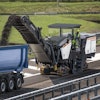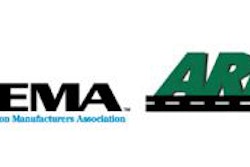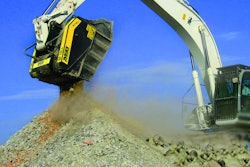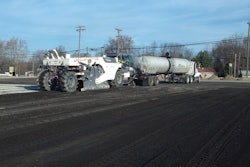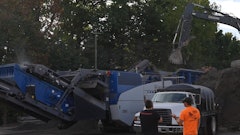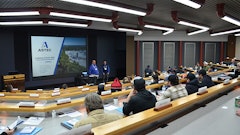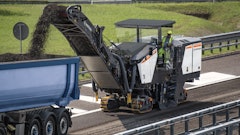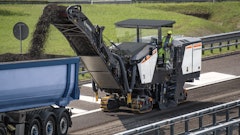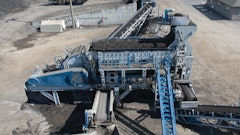Each year, since 1985, ARRA has presented special recognition awards to deserving public officials and consulting engineers for their overall professional contribution to, and their promotion of, the asphalt recycling & reclaiming industry. During its 38th Annual Meeting, in Aventura, Florida, in February, the Asphalt Recycling & Reclaiming Association (ARRA) announced the recipients of its 2014 awards:
ARRA 2014 Charles R. Valentine Award for Excellence in Cold In-Place Recycling
Dave Laurie, Director
Mike Alcock, CET
County of Huron, Goderich, Ontario Canada
Dave Laurie and Mike Alcock are recognized for their continued commitment to Cold In-Place Recycling (CIR) in Huron County Ontario. Dave is the Director of Public Works and his main responsibilities include management of the roads department and other projects. Dave has been with Huron for eight years. Mike is a Civil Engineering Technologist and his main responsibilities are Capital Project Management and Maintenance programs and he has been with the county for 10 years.
Huron County has one of North America’s longest running in-place asphalt recycling programs and has been performing CIR on its roads successfully since 1998. Out of a total 730 kilometer road network, approximately 50 percent has been remediated using CIR with average yearly workloads in the range of
30 double lane kilometers.
Dave, Mike and Huron County have shown continuous commitment to CIR over the years and for good reasons. For county council representatives, when CIR was instituted, it was an innovative process which expanded their ability to effectively manage their paving program in an environmentally friendly and cost effective manner. For Dave and Mike, CIR is an excellent process because of its technical merits in crack mitigation and ability to correct wheel rutting and crossfall.
CIR construction on County Rd 10 is one of Huron’s current-year projects. CIR was selected to help repair the road’s distressed surface, eliminate end-load segregation, repair wheel rutting, correct the crossfall and widen the lanes. Another reason for choosing CIR was that the road was a considerable distance from the closest hot mix plant, making for long haul distances. County Rd 10 is a busy cottage and tourist route on the shoreline of Lake Huron and is used by locals, visitors and businesses throughout the year. The goal was to rehabilitate the road with a solution that would last for 20-25 years and CIR was the most cost-effective option. The project is currently nearing completion and will be below budget. The successes with CIR in Huron County have been many but there have been some challenges and improvements along the way. One operational challenge in the past related to construction of the CIR mat
was the presence of poor soil conditions beneath roads in low lying terrain. In areas where native soil conditions had limited bearing capacity, the asphalt recycling programs were augmented by the addition of fiberglass grid incorporated between the asphalt layers. The integration of this technology helped Dave and Mike to bridge problem areas and construct a lasting road surface.
Another past construction challenge had to do with lane widening during the CIR process. Traditionally, a grader was used to excavate the broadened section - equipment that proved somewhat unwieldy given the precise nature of the work. The resultant lane usually ended up wider than planned and left an
unconfined edge to compact against. This in turn, resulted in the CIR mat being pushed out wider leaving a rounded outer edge when compacted. In the past few years, construction crews have transitioned to incorporating the granular shoulders into the milling process by using a half-meter milling machine to process the shoulder width ahead of the CIR train. This construction technique allows for a more precise widening of the lane and the creation of a confined edge to place and compact material against. Dave and Mike plan to continue rehabilitating roads in Huron County using CIR and expect that all
remaining roads will be recycled within the next 10-15 years. CIR has a proven track record in the area and even the initial road projects from 1998 are performing very well. Dave Laurie and Mike Alcock of Huron County, Ontario are excellent candidates for the 2014 ARRA Special Recognition Award.
ARRA 2014 Award for Excellence in Full Depth Reclamation
Ben Kester, C.E.T., CRS-S, Director of Public Works and Operations
The Township of Uxbridge, Ontario, Canada
Ben Kester, C.E.T., CRS-S, Director of Public Works and Operations, has shown a long-standing development and commitment to the Full Depth Reclamation (FDR) with Foamed Asphalt stabilization process in the Township of Uxbridge. As Director of Public Works and Operations, Ben is responsible for policy development, program planning, fiscal management, administration, and direction of the Township’s Operations Department. Areas of esponsibility include the activities and operations related to roads, parks, traffic operations and maintenance.
Ben is the sole reason for the implementation and continued success of the FDR program in the Township of Uxbridge. He first incorporated the FDR process in 1997, utilizing emulsified asphalt as the bituminous binder for predicted benefits of cost reduction, enhanced performance, and a reduced environmental impact compared to other rehabilitation alternatives. In approximately 1999, Ben started to utilize FDR with foamed asphalt stabilization and to this day, utilizes this process compared to competing rehabilitation processes. Figure 1 illustrates a typical section of the first FDR with Emulsion Stabilization job performed in 1997, exhibiting excellent performance. With this type of performance the process is readily accepted within the Township.
Ben utilizes this process nearly exclusively as a rehabilitation method, processing approximately 50,000 m2 of roadway every year. Uxbridge is challenged with having many gravel pits within its municipality, making road maintenance planning difficult as extraction schedules vary significantly from these
sources. Ben has recognized the strength improvement provided by the process and therefore, has utilized it on many aggregate haul routes. In addition, the process eliminates cracking in the existing bituminous layers and allows him to maintain the existing vertical grade, thereby saving construction time and money on adjusting appurtenances with virgin aggregate.
Under Ben’s direction, road condition data are stored in the Township’s asset management software which is used to predict roads requiring maintenance at a designated time, thereby assisting Ben in determining which roads will require preservation or rehabilitation. Ben utilizes Seal Coats and Slurry Seals as preservation techniques when the bituminous pavements are still rated as Good or better. When the roadway condition falls to a “Fair” condition, Ben implements FDR with foamed asphalt stabilization to improve the condition of the roadway. In the year prior to rehabilitation, Ben improves ditching and drainage to ensure the water is removed from the pavement structure, thereby eliminating any concerns of accelerated performance issues due to moisture. The use of FDR with foamed asphalt permits eligibility for Gas Tax Funding which is directly used for his road program every year. Without this funding, Ben would struggle to keep his Township at the current condition level.
This year, Ben tendered a 45,000 m2 FDR with foamed asphalt contract where 100 mm (4”) of the existing structure was pulverized and then 75 mm (3”) of the pulverized material was treated with foamed asphalt. The contract included four separate roadways of rural cross section. Once completed and cured, the FDR with foamed asphalt was covered with between 50-60 mm of HL4, depending on
traffic. Within the last few years, Ben has also increased the amount of RAP permitted in his hot mix to
20%, consistent with the Province of Ontario.
Ben’s commitment to innovation does not stop with implementing FDR with expanded asphalt. In an
effort to further reduce costs and increase performance Ben is currently undergoing a gravel road
upgrade program with the use of Cape Seals for these roadways. In addition, Ben has also implemented
the use of geotextile paving fabrics within Seal Coats to help mitigate reflective cracking. After a trial in
2011, Ben continued with its use this year, applying 10 km of the treatment.
Ben continues to educate his council on the progress of the pavement maintenance program and the
treatments employed to achieve a high level of service to the public. The commitment to FDR
accomplished by Ben, year after year, are truly unprecedented. Ben Kester is deserving of the 2014
Special Recognition Award for FDR.



